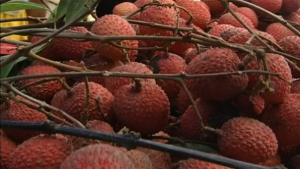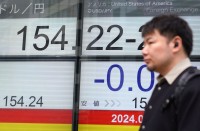
JUNE 24 (Reuters) — Lychee farming was once seen as one of the most organized sectors in Madagascar, a key pillar of the Malagasy economy.
Madagascar is the fifth largest lychee producer in the world, after China, India, Vietnam and Taiwan. But a 2009 coup plunged the country and its economy in turmoil, reversing previous gains made in the lychee industry.
Prior to the political crisis, Madagascar used to export an average of more than 30,000 tonnes annually, mainly to European markets, but this tonnage has steadily declined to 22,500 tonnes.
Today as its economy show signs of recovery, the government of Madagascar is trying to revive the industry.
80 percent of people in Madagascar who live in rural areas depend on agriculture. A large proportion of these populations also depend on the lychee harvest season for an income.
According to official figures, the annual lychee season involves over 6,000 workers in export stations, 3,000 collectors and over 20,000 farming families.
Although the lychee season lasts about 8 weeks it is estimated that farming families earn 80 percent of their annual revenues from the season.
“Sometimes you can rise up to 4 to 5 million FMG (437 USD to 546 USD) a month, but it all depends on the demand on the market,” said one lychee vendor, Rasoabe.
“Selling lychees can bring in some money, and you don’t have to rely solely on your salary. Selling lychee is another way to make some extra money, especially here where you often have large families,” said Angelin, another lychee vendor.
This year, growers hope that a better quality crop and a more favorable economic climate will boost the sector.
Looki Mickael is the joint manager of Getco, a lychee export company.
“We have made a lot of inroads in terms of quality, in terms of regularizing the sector, and in terms of treatment control, which goes towards the preservation of the lychee when it’s being exported. We have made a lot of progress in quality of lychee,” he said.
According to analysts, good climatic conditions as well a concerted efforts by the sector to implement and harmonize good agricultural practices, is expected to help boost lychee production in the country.
“Today we have the support of the European Union, which has helped us to improve our quality, to plant, not only for export home, but also for the local market. Now, we are also back on the world stage, we are once again part of SADC, we are also back with the COMESA group. Today it is not just Europe that is able to export lychees, we can also export and that’s our strength,” said Narison Rafidimanan, Madagascar’s former minister.
According to the Association of Exporters of lychee, this year’s campaign has started off on a positive track, closing off with more than 18,000 tons stems, scripts, exported and set to bring in an estimated 21 million USD in revenue.







